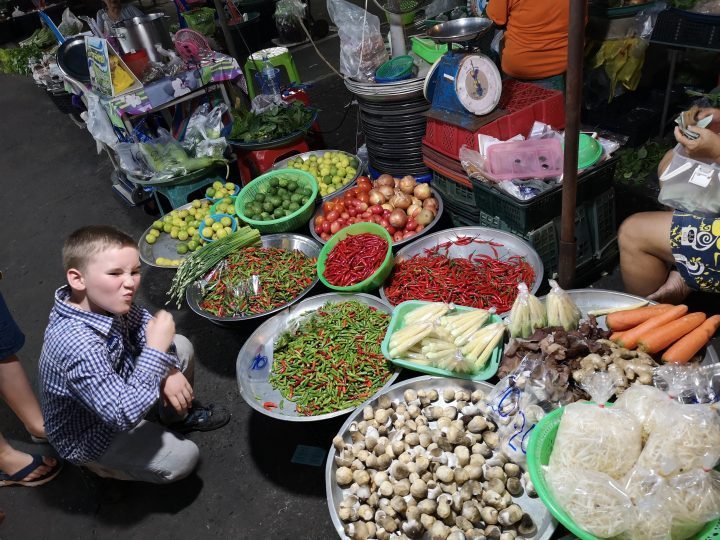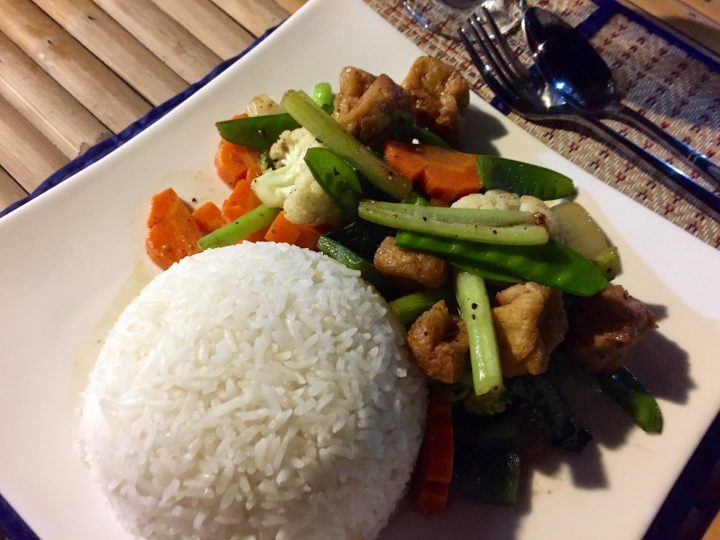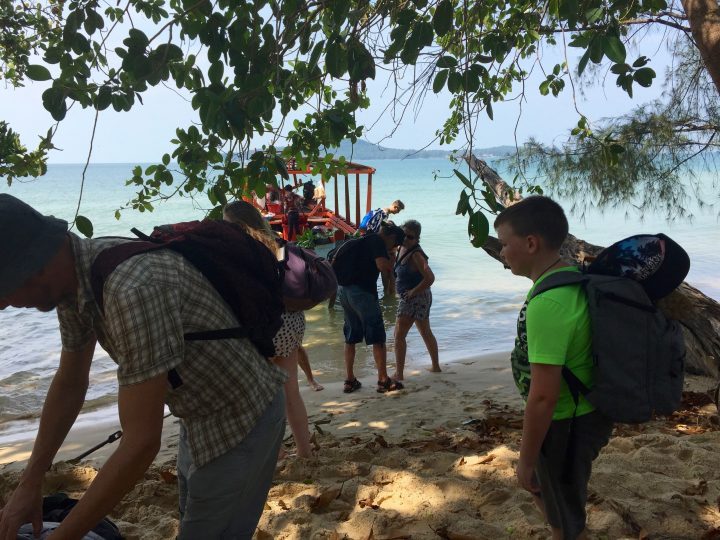Maybe it is not a question of IF you got sick when you travelled in high-risk countries of getting the “jungle bug” – travel diarrhea and/or food poisoning – but how often and for how long? So, why do we get it? And more importantly; How can we prevent it from coming in the first place?

Nightmarket in Trat, Thailand
What are the most common signs and symptoms of traveler’s diarrhea?
- Abrupt onset of passage of three or more loose stools a day
- An urgent need to defecate
- Abdominal cramps
- Nausea
- Vomiting
- Fever
This is how your body tries to kick out the toxins and parasites and get you better. So ride it out! While some cases last longer, it’s usually gone within a few days.
Sometimes, people experience moderate to severe dehydration, persistent vomiting, a high fever, bloody stools, or severe pain in the abdomen or rectum. If you or your child experiences any of these signs or symptoms or if the diarrhea lasts longer than a few days, it’s time to see a doctor.

Night market in Trat, Thailand
What causes travelers diarrhea?
- You typically develop traveler’s diarrhea after ingesting food or waterthat’s contaminated with organisms from feces. These organisms are infectious agents — including various bacteria, viruses and parasites — that enter your digestive tract and overpower your defense mechanisms, resulting in signs and symptoms of traveler’s diarrhea.
- The most common cause of traveler’s diarrhea is enterotoxigenic Escherichia coli (ETEC) bacteria. These bacteria attach themselves to the lining of your intestine and release a toxin that causes diarrhea and abdominal cramps.

Ginger tofu at Wood house, Koh Kong, Cambodia
How can we Prevent travelers diarrhea and food poisoning?
1. Watch what you eat
The general rule of thumb when traveling to another country is this:
Boil it, cook it, peel it or forget it.
Studies show, however, that you can still get sick even if you follow these rules. Remember these tips to decrease your risk of getting sick:
- Don’t consume food from street vendors.
- Avoid unpasteurized milk and dairy products, including ice cream. Check labels for evidence of pasteurization; most canned milk is safe.
- Avoid raw or undercooked meat, fish and shellfish.
- Germs will be killed off pretty much universally by boiling, and germs can’t get into food that has a peelable skin in most cases.
- So Eat foods that are well-cooked and served hot.
- And stick to fruits and vegetables that you can peel yourself, such as bananas, oranges and avocados. Stay away from salads and unpeelable fruits, such as grapes and berries.
- Be aware that alcohol in a drink won’t keep you safe from contaminated water or ice.
- Food that has beenleft out and exposed for a period of time
- Food that is shared, such as in buffets undercooked, raw, or reheated food, especially meat, fish, or rice.
- Seek out food items that require little handling in preparation.
- Switching up your diet too drastically can topple all but the hardiest constitutions; for example, if you eat mostly fruit and vegetables at home, jumping into having barbecue or lots of sugar three times a day might not be a great idea.
- Spoiled or tainted food can cripple travelers for a few days, or worse; a good indicator of the freshness and edibility at any given restaurant is how many people are eating there and how many of them are locals.
- Cold meat platters, cheese, buffet foods and unsealed mayonnaise are often home to rampant bacteria.
- Seafood dishes are notorious for causing intestinal problems, as fish accumulate contaminants from a wide variety of sources. Smaller fish tend to be safer. Fish organs and shellfish (such as clams, mussels and oysters) are usually best avoided.
- Nuts and other shelled foods are usually a good choice.
- Order portions “well done” or at least “medium well,” and eat them only if served hot. Be careful especially of runny eggs and sandwiches with lots of raw vegetables.
2. Don’t drink the water
- Avoid unsterilized water — from tap, well or stream. If you need to consume local water, boil it for three-ten minutes or use an adequate filter.
- Avoid locally made ice cubes or mixed fruit juices made with tap water. Ask at bars and restaurants how they make the ice if possible. Or ask for no ice!
- Beware of sliced fruit that may have been washed in contaminated water.
- Don’t swim in water that may be contaminated.
- Keep your mouth closed while showering.
- Feel free to drink canned or bottled drinks in their original containers — including water, carbonated beverages, beer or wine — as long as you break the seals on the containers yourself. Wipe off any can or bottle before drinking or pouring.
- Use bottled water to brush your teeth. Put a sticker on the mirror or a ribbon on the tap to remind you not to drink the water.
- Use bottled or boiled water to mix baby formula.
- Order hot beverages, such as coffee or tea, and make sure they’re steaming hot.
If it’s not possible to buy bottled water or boil your water, bring some means to purify water. Consider a water-filter bottle such as Water-To-Go (read more about water here).
You can also chemically disinfect water with iodine, colloidal silver or grapefruitseed oil (even if the oil is very, very bitter).
3. Make sure dishes and utensils are clean and dry before using them.
4. Wash and sanitize your hands before eating or drinking, or putting your hands in your mouth…
- Wash your hands often and always before eating. And use an alcohol-based hand sanitizer with at least 60 percent alcohol to clean your hands before eating.
- Keep children from putting things — including their dirty hands — in their mouths.
5. Stay Hydrated
- Stay hydrated and drink a lot of water
- Dehydration not only makes you more vulnerable to invading bugs (sometimes in unexpected ways) but can really weaken your system (you can read more about water and hydration here).
6. Get enough sleep
Sleep is your most effective weapon against becoming ill or fighting it off once you are already infected; in fact, sleep and hydration together are your best tools both for prevention and recovery from illness on the road.
7. General Nutrition
- Those most at risk for foodborne illness are the pregnant, the elderly and those with weakened immune systems. However, being on the road can be rough on even the healthiest travelers.
- In the midst of dashing from one place to the next, it’s easy to neglect proper nutrition; following irregular eating schedules or existing for days on the same foods can compromise the immune system and cause a cascade of health problems.
- Try to maintain a well-balanced diet. In the absence of meat, you can find protein in eggs, nuts, veggies, oats, quinoa, lentils, beans and tofu.
- Peelable fruit and vegetables are a good source of trace minerals and vitamins.
8. Take care of your gut with probiotics
- Probiotics are live microorganisms that can be consumed through fermented foods or supplements.
- More and more studies show that the balance or imbalance of bacteria in your digestive system is linked to overall health and disease.
- Probiotics promote a healthy balance of gut bacteria and have been linked to a wide range of health benefits. These include benefits for weight loss, mental health, emotional health, digestive health, immune function and more.
- Probiotics are widely known for their ability to prevent diarrhea or reduce its severity.
- Probiotics can help with many forms of diarrhea not only those associated with antibiotics.
- A large review of 35 studies found certain strains of probiotics can reduce the duration of infectious diarrhea by an average of 25 hours.
- Probiotics reduced the risk of travelers’ diarrhea by 8%. They also lowered the risk of diarrhea from other causes by 57% in children and 26% in adults.
- The best probiotics we know of is “Dr Ohhira Professional formula”.
- While travelling it is important to have probiotics that does not need to be in a fridge.

Fresh coconut goodness in Koh Samet
Conclusion
You probably aren’t going to avoid a bit of stomach upset completely on your travels — especially if you are traveling long term — but if you are aware of good food hygiene practices and follow them as much as possible, then you can at the very least minimize the risk of becoming ill.
If you also get your immune system to work well with probiotics and good nutrition, you can recover faster if you do get ill.
Good luck and please share your experiences with us in the comments below!



